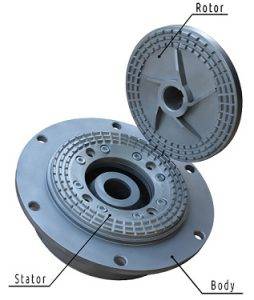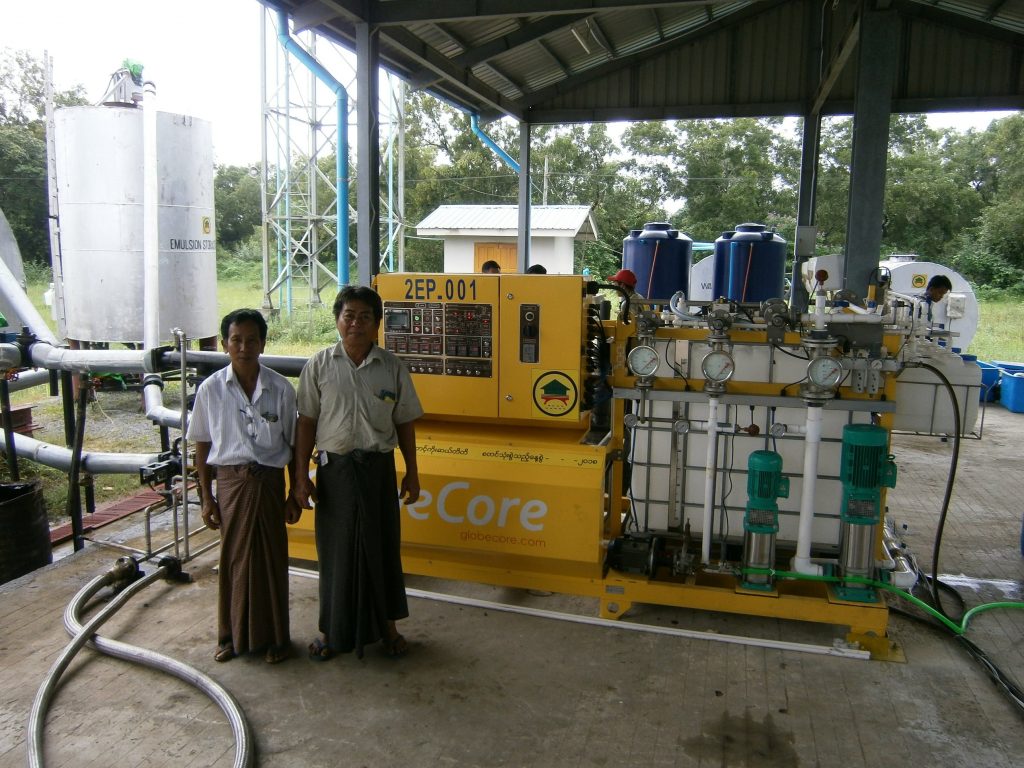Colloid Mill for bitumen emulsion production
Manufacturing of bitumen
and asphalt emulsion manufacturer
About us
GlobeCore is proud to offer you the GlobeCore® colloid mills, designed and produced by our company.
The CLM colloid mill is specifically designed for production of highly stable colloidal solutions, superfine suspensions, blends and emulsions of bitumen. The mill features wet grinding due to the gap between rotor and stator cones being larger at the inlet and smaller at the outlet.
Principle of grinding of bitumen emulsion colloid mill
The main principle of grinding in the colloid mills is wet grinding. This technique is based on feeding pre-mixed solid and liquid insoluble components of suspension or emulsion into the grinding zone of the mill, which consists of the following components:

Grinding zone of the emulsification pump+mill
After the product enters the grinding zone, the process of homogenization and dispersion begins: one substance (solid) is pulverized and is evenly dispersed within the other substance (liquid phase), creating a stable homogeneous emulsified product. The fine degree of grinding in the GlobeCore mills is facilitated by proprietary design of the cutting parts of the mill and may reach 1 – 5 micron. The impeller of the rotor also creates cavitation effect, which further accelerates the dispersion process.
Water-bitumen emulsions
The components used for production of bitumen emulsions are bitumen, water and emulsifiers, which allow to adjust the properties of the product: breakdown time, binder consumption, improvement of molecular adhesion.
Bitumen emulsion is a dark brown liquid obtained by dispersing bitumen in water with a surfactant (emulsifier). The ratio of water and bitumen determines one the two types of emulsion: direct or inverted.
Bitumen emulsions are considered direct emulsion if the portion of bitumen, dispersed in the continuous phase (water) in the form of microscopic droplets is 30 – 70%. Inverted emulsions, on the other hand, have 70 – 80% water dispersed in bitumen.
The chemical nature of surfactant emulsifiers determines the class of the surfactant:
- anionic
- cationic
Modified bitumen is based on heavy bitumen by injection of polymers: block copolymers “Kraton” and “Butanol-198”, plasticisers and surfactants as per the requirements of accepted technology standard.
The CLM colloid mill is one of the main components of the UVB-1 bitumen emulsion production system.

A 2 m3/hour continuous water bitumen emulsion production system
The complex geometry of the rotor surface generates increased turbulence, which shears product particles.
The high degree of homogenization of the mill allows it to be used in many industries, such as:
- Road construction
- Chemical
- Food production
- Pharmaceutical
- Cosmetics
- Oil processing
To determine the correct equipment type and address the client’s requirements, the first question which must be answered is: “What is the required process: dispersion, homogenization, suspension, emulsification, solution or pulverization?”. Not the least important is also the question of which product must be dispersed in which substance? The correct answers will allow GlobeCore engineers to quickly and accurately select the needed mixing equipment.
Expect professional communication and qualified answers regarding equipment selection for the required mixing task.
The main advantages of the wet grinding GlobeCore colloid mills are:
- Modern design and high quality of the device
- Competitive price
- Competent engineering consulting
- Fast production of the order
- Stability of the mix to stratification
- Heating/cooling jacket
- High-tech production lines and qualified staff (over 200) allows to expedite orders
- Ability to adjust the gap of the grinding zone without the need to remove the device from the production line
- Grinding to 1 micron
- Component parts from universally recognized manufacturers
- Operating temperature range from -30 С° to 180 С°
- Optional soundproofing
| No | PARAMETER | CLM – 22.2 | CLM – 18.1 | CLM – 4.1 | CLM – 05.3 |
| 1 | ***Capacity rated, m³/hour, up to. | 22 | 18 | 4 | 1,8 |
| 2 | Operating pressure, bar. | 0,5 | 0,5 | 0,5 | 0,5 |
| 3 | Rotation speed, RPM | 3 000 | 3 000 | 3 000 | 3 000 |
| 4 | **Max heat carrier temperature, °C | 160 | 160 | 160 | 160 |
| 5 | **Minimum coolant temperature, °C | -4 | -4 | -4 | -4 |
| 6 | Dispersion, micron | <50 | <50 | <50 | <50 |
| 7 | Nominal pressure/suction bore diameter, mm | 80/120 | 80/80 | 32/65 | 32/32 |
| 8 | Drive power, kW | 55 | 11 | 5,5 | 3 |
| 9 | *Dimensions, mm
– length – width – height |
1440 430 650 |
1000 400 460 |
960 310 400 |
960 310 400 |
| 10 | Weight, kg | 490 | 135 | 125 | 125 |
Note.
* – Dimensions are driven assembly.
** – If necessary, the product can be either heated or cooled to a desired temperature.
*** – Depending on the physical and chemical characteristics of the product capacity may vary.
Clients speak about GlobeCore mills:

Mr. Shekanabo, the United Republic of Tanzania:
“I can only say good things about GlobeCore mills. After seeing the production facility, I had no doubts that this is a serious and reliable company with professional staff, and the system works like a clock. Of course, the production itself seems complicated, but the equipment is powerful and rugged.”

Mr. Patel, the United Republic of Tanzania:
“I want to wish GlobeCore success in the future and I think we will maintain our cooperation for many more years. May you have as many successful products and new developments as possible.”
Our location:
The production facility is located in Oldenburg-Eversten, Germany, Edewechter Landstraße 173.

